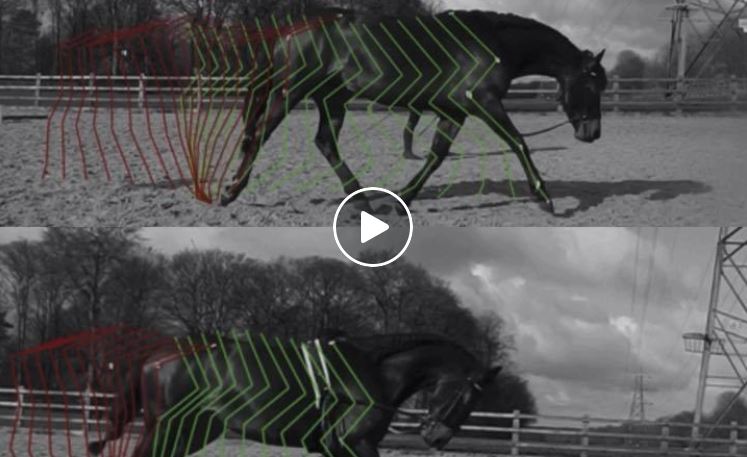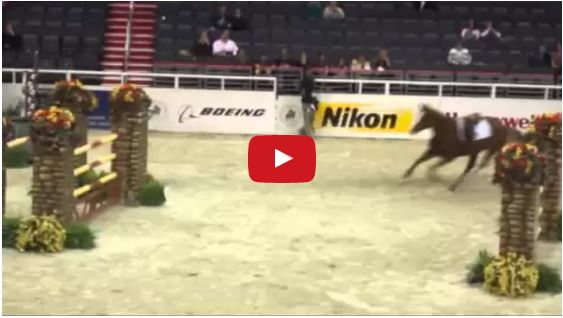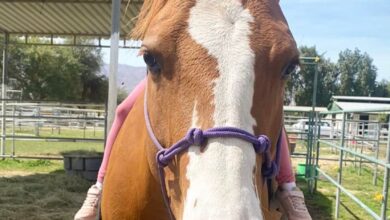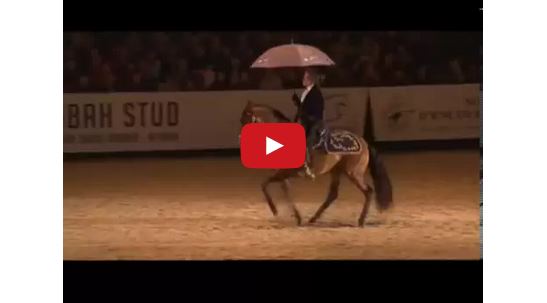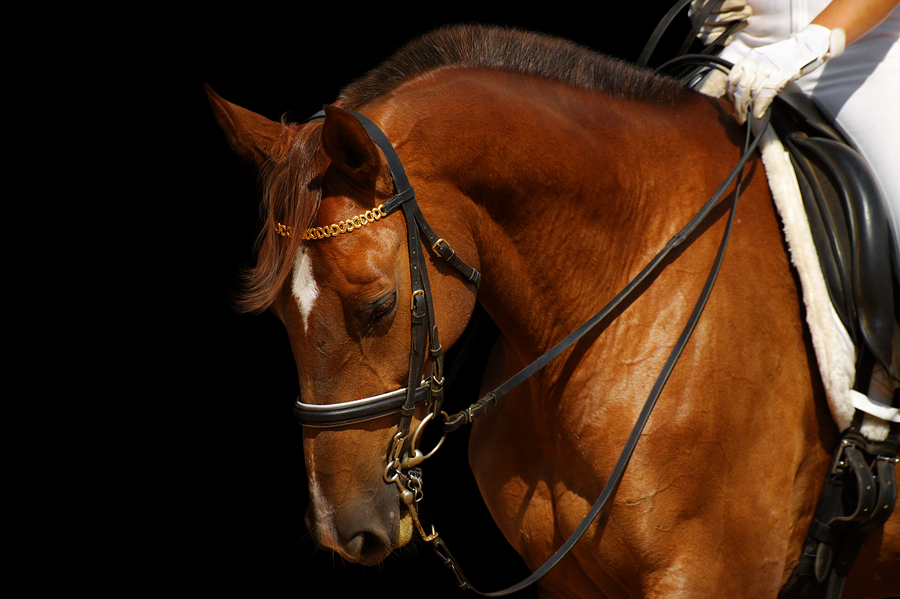How To Use Sports Psychology To Gain A Cutting Edge In Equestrian Competition

 Those of us who compete on horseback have all felt those performance nerves: sweaty palms, butterfly-filled stomachs, and mind racing at a million miles per hour. We’ve all doubted ourselves: what if I knock down a rail? What if I hit a barrel? What if I mess up the pattern? Competition puts on a lot of pressure for both us and our horses mentally. And in a setting where a thousandth of a second can make or break a run, being mentally “in the game” can make all the difference in the world.
Those of us who compete on horseback have all felt those performance nerves: sweaty palms, butterfly-filled stomachs, and mind racing at a million miles per hour. We’ve all doubted ourselves: what if I knock down a rail? What if I hit a barrel? What if I mess up the pattern? Competition puts on a lot of pressure for both us and our horses mentally. And in a setting where a thousandth of a second can make or break a run, being mentally “in the game” can make all the difference in the world.
Horses are highly emotionally sensitive animals. They are the best animals to use in human psychotherapy for this very reason–they pick up on emotions even better than we as humans can. This is all based in biology. Horses have an incredibly developed limbic system–or emotion center of the brain–which means they have an unusually high capacity to read the emotions of their surroundings. They understand body language, intention, tone of voice, and other forms of nonverbal communication exceptionally well. They tend to pick up on how we are feeling and mirror those emotions back. Therefore, in all equestrian sports, the mental state of the rider is vital in the success of the horse. While horses do have their own distinct personalities and some are more prone to anxiety and stress than others, ultimately the mental state of their riders will have a huge influence on how the horse performs. Therefore, being strong mentally is incredibly important in competition. If you exercise yourself and your horse physically in preparation for equestrian competition, why not exercise your mind as well?
Understanding the basics of sports psychology can help you immensely in long-term preparation for performance, immediate preparation for performance, and during the actual performance itself. These mental skills are like any other physical skill–they need to be practiced daily and you need to fully commit to them.
First and foremost, in long-term preparation for performance, you need to learn how to frame the sport in your mind. Attitude is a choice, and if you want to be successful in your sport, your choice must be to have a positive attitude as much as possible. You need to mentally frame your event, whether you run barrels or compete in pleasure, as an opportunity to compete against yourself, not others. You need to empower yourself in your performance and allow yourself to be in charge of your own success; do not allow others to define your success for you. And if you make a mistake, you must be able to let go of perfectionism, learn from your failures, move on, and improve for the next time.
Another important aspect of long-term performance preparation is setting realistic goals. While it is important to have long-term goals to strive towards, bigger goals are built upon short-term, attainable goals. Almost every person who has made the world championships in their discipline at one point was competing at a smaller event, struggling to win that blue ribbon. Follow the S.M.A.R.T. acronym when identifying goals. Are your goals Specific? Measurable? Attainable? Realistic? Timely? Make sure to set a deadline towards each of those small goals. How long do you think you need to achieve that goal? Mark that date on your calendar. Then, sit down and decide on a specific and detailed plan to achieve that goal. Do you want to compete at that jackpot at the end of the month? How many days do you have to practice before then so that you’re ready? What will each practice look like on each day? Map it out, and write it down to keep yourself accountable. Every person competing at the top of their discipline has something in common: commitment. You must commit to your goals, even when your motivation is lacking during the day-to-day training drills.
This brings us to the next mental skill: motivation. Motivation can be difficult to keep up throughout competition, especially when the rewards and benefits expected from the competition aren’t forthcoming. Again, frame the competitions in your mind in a way that empowers yourself. The benefits of competition are in your personal journey. If you are struggling with motivation, stop, ground yourself, and find your center by reminding yourself of the reasons why you love horses and competition. Make a short list of these reasons and repeat them in your head if you struggle. Be mindful and catch yourself if you are feeling negative feelings towards the sport, and rekindle your passion!
If you are able to maintain a positive attitude, set realistic goals, and motivate yourself in a healthy way, then you will be mentally ready to start competing. On the day of the competition, there are two exercises you can practice to keep yourself mentally sharp and ready to perform. These can be done from the moment you wake up, to your warm up before your class, all the way up to right before you enter that arena.
The first is to practice positive and realistic mental imagery. Before you compete, picture yourself in great detail doing well in your performance. You want this mental picture to be as clear and specific as you can. Picture your body physically: what are your hands doing? Your seat? Your legs? Picture your horse doing every maneuver perfectly. Where are his feet? His head? His shoulders? Try to actually feel him beneath you as you picture this. Be realistic. If you are competing at an amateur level, don’t picture what a world champion looks like. Picture yourself with your own horse and a performance that would be considered successful for yourself at your own level. Picture the performance happening in the place that you are competing under the conditions you are competing. If it is raining, picture yourself performing well in the rain. You want your mental image to be as realistic as the actual competition. Try to give yourself 15-20 minutes of quiet mental imagery time before you compete. Go to a quiet place, close your eyes, and imagine your performance over and over again. Then, as you groom your horse, tack up, warm up, and prepare to enter the arena, try to keep that imagery in the back of your mind.
The second exercise is utilizing positive self-talk and positive mental framing. Self-confidence is vital to success in performance, and one way to keep up self-confidence is by thinking positive thoughts about yourself and your performance. Even if you are struggling, what are some things that you do well? How have you improved lately? What are some aspects about your performance that you think you succeed very well at? Focus on ideas like this and repeat them to yourself over and over again. Another very important thing is to never think negative thoughts, always frame things positively to yourself. If you have a bad competition day, try to think of specific things that you did well and write them down, instead of just focusing on the negatives. While our mistakes do help us improve, ruminating on them hinders our forward progress. Another important thing to do is to frame your thoughts positively towards your event. Instead of thinking “I hope I don’t hit a barrel”, think “I will run clean”. Instead of thinking “I hope I don’t mess up the pattern”, think “I will do the pattern perfectly”. It’s simple changes like this that help retrain our brain to have a positive focus rather than a negative one.
Then comes the performance itself. You enter that arena, back up into that roping box, start towards that first jump, or take off down that alleyway. If you’re like me, the adrenaline rush takes over, and it’s hard to think about much of anything besides keeping everything under control and operating smoothly. What can you do in the heat of competition to keep your mental game strong?
First, know how to manage anxiety. Anxiety and nerves are going to be a part of competition, so accepting them as essentials in performance is the first step to managing them. After you’ve accepted that there will be anxiety involved, the next step is to understand that it can be used to your advantage. With nerves, comes adrenaline. Adrenaline increases blood circulation, which aids in bringing more oxygen to your brain, allowing for quicker and better decision-making as well as to your muscles, which allows for better athletic performance. Your horse, being the highly emotionally intelligent animal that he is, will pick up on these nerves, and mirror the same feelings, which will trigger the same chemical reaction in himself. However, despite its benefits, too much anxiety can push you and your horse over the edge and the nerves can impact your performance negatively. Finding a good emotional balance is important in competition, and it will take practice to find your personal emotional threshold. If you find yourself overboard with nervousness, there are exercises you can practice to keep yourself calm yet ready for action. The most basic way to become relaxed in a highly intense moment is by practicing deep breathing. Take long, deep breaths and concentrate on keeping that breathing pace. This is beneficial because it increases the amount of oxygen in our bodies, which again allows for better thinking and decision-making. Deep breathing also allows for muscle relaxation. Being too tense is typically a result of being over-stressed and holding your breath, therefore relaxing your muscles is key to calming down. There are two ways to relax your muscles, either passively or actively. Passive muscle relaxation is for when you are in less intense environment, such as right before or during a pleasure or trail class. Try to focus on each muscle beginning with your toes, slowly working up all the way to your face, and relax each major muscle group while deeply breathing. If you are in a highly intense environment with high-strung horses, such as a rodeo or cross country, active muscle relaxation might be better suited for you. Active muscle relaxation involves tightening and relaxing muscle groups in quick succession. These muscle groups include: the face and neck, arms and shoulders, chest and back, and buttocks and legs. Practicing these outside of competition will help you when you are in the midst of competition, so practice, practice, practice!
Finally, it’s incredibly important to keep focused during your competition. In the heat of action, need to be able to distinguish between performance-relevant cues and performance-irrelevant cues and hone your concentration only on the things that are relevant to aiding your performance. For example, if you are competing in a rodeo, you might want the music, the announcer, and the crowds to fade into the background while focusing in on your horse, the ground, and your own body position. It’s also important to differentiate between focusing and thinking. Try not to overthink or overanalyze while in a performance situation–those traits are best left to the practice pen. In a competition setting, allow muscle memory to take over and trust your own ability and your horse’s abilities as athletes.
Just as with physical skills, mental skills take time, patience, and practice to improve. Many aspects of mental training will emerge naturally as part of being a good competitor, but others may take a lot of focus and practice to perfect. Know your strengths and weaknesses, and focus on those weaknesses to improve them. You are in charge of your own success, so define it, practice it, and then achieve it!
Written By, Brittany Hempel. Share this on Facebook if you agree that being “mentally” in the game can make all the difference in the world!

